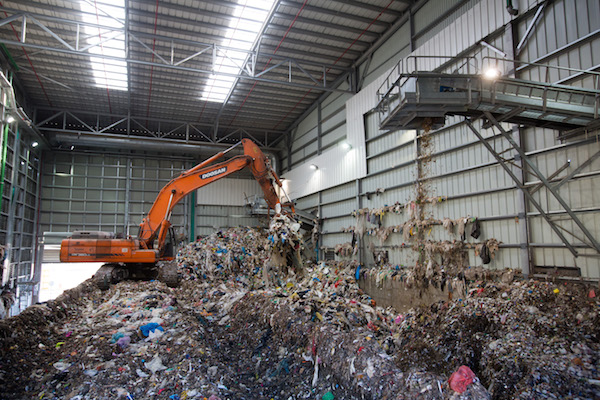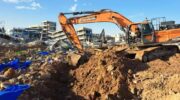A bulldozer lifts garbage at the Greenet recycling plant in Atarot industrial zone, near Qalandiya, on June 16, 2015. (Sindel/Flash90)
Israel has been dumping its waste on Palestinian land for years. Now it has confiscated Palestinian garbage trucks…
BACKGROUND: Al Jazeera reported in December 2017:
Israeli rights group B’Tselem has released a scathing new report detailing Israel’s transferral of waste to treatment facilities in the occupied West Bank, in violation of international law. According to the report, released on Tuesday, Israel has established at least 15 waste treatment facilities in the West Bank to recycle waste largely produced inside Israel.
Six of the facilities process hazardous waste that poses serious health and environmental risks for surrounding Palestinian communities, the group stated.
The report details five Israeli facilities in the West Bank treating waste from Israel, four of which handle hazardous waste, including biological and medical waste, solvent waste from the pharmaceutical and chemical industries, oil waste and electronic and metal waste.
Israel produces some 350,000 metric tonnes of hazardous waste each year, according to B’Tselem.
Environmental regulations inside Israel can make the operating costs of waste treatment facilities high…In the West Bank, which has been ruled by Israeli military law since 1967, Israel can loosen its environmental policies to allow waste facilities to operate more cheaply.
“Israel has turned the West Bank into a garbage dump,” Adam Aloni, a B’Tselem researcher and author of the report, told reporters at a news conference.
Reposted from IMEMC News, July 10, 2019
A group of Israeli soldiers on Wednesday detained Palestinian municipal employees in the village of Beit Fourik, in the northern West Bank, and seized several vehicles used for trash collection.
According to local sources, the vehicles that were seized include a garbage truck, a tractor used for hauling garbage and a third vehicle used in trash collection.
The vehicles were loaded with garbage and were headed to a landfill site east of the village, located near Nablus in the northern West Bank, when they were detained by Israeli soldiers in military vehicles.
The soldiers approached with weapons drawn and ordered the municipal employees out of their vehicles, then held them for several hours in the hot sun, and took the vehicles away to an unknown location.
The Palestinian Wafa News Agency spoke with Ata Samara, a health inspector with the Beit Fourik village council, who told them that this trash collection by the municipality is a daily collection, and this is the first time they have been harassed by Israeli occupation forces.
Samara added that the trash dump is located in Area B of the West Bank, which is administered by the Palestinian Authority but falls under Israeli military rule, adding that the village council was not informed by the army that it would no longer be allowed to dump there. He said the seizure of the truck and car is part of an effort by the Israeli army to make life difficult for the Palestinians in that village.
Without a trash truck or a place to put garbage, the Palestinians of the village will be forced to fend for themselves, which will likely result in a buildup of trash at homes in the village, and unsanitary conditions will result.
Israeli authorities have created multiple landfill sites for Israeli garbage on stolen Palestinian land in the West Bank, and frequently haul and dump Israeli garbage onto Palestinian village land. However, in recent years the Israeli authorities have made it harder and harder for Palestinians in the West Bank to dump their garbage, instead closing off the Palestinian landfills and dumps or putting roadblocks to prevent the Palestinians from reaching them.
Israeli forces have targeted the village of Beit Fourik for collective punishment, in violation of the Fourth Geneva Convention, since March, when an Israeli settler was killed in a settlement nearby. [Israeli forces had already killed 11 Palestinians that month._
RELATED READING:
Israel says “No” to clean running water for Palestinian villages
Israeli Settlement Pollutes Palestinian Olive Groves With Sewage Water
Khan al-Ahmar: tragedy and outrage





